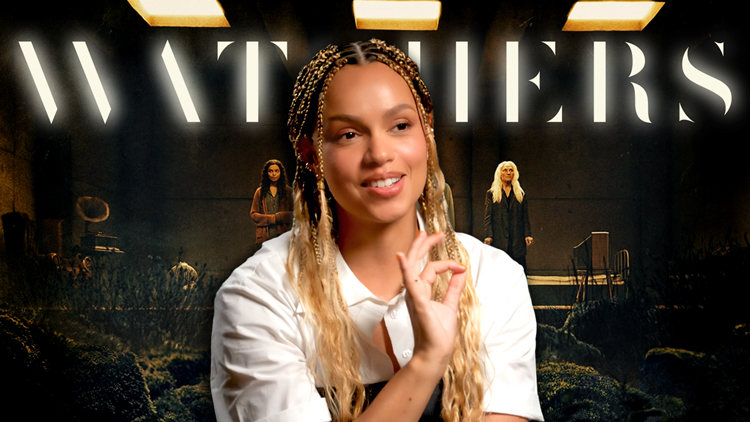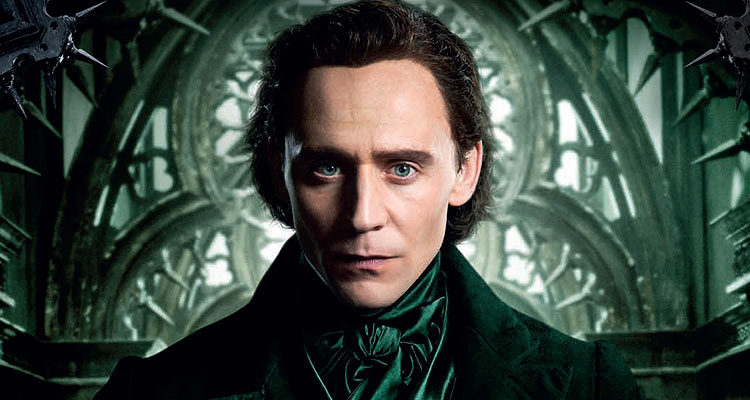A few days ago I had the pleasure of being part of an intimate press conference in New York with the cast and the filmmaker behind the new Universal Pictures film CRIMSON PEAK.
Read below what Tom Hiddleston had to say about this Gothic romance and her character Thomas Sharpe, including some details that may be considered spoilers.
CRIMSON PEAK opens in theaters nationwide this Friday, Oct. 16.
Desde Hollywood: Do you prefer to play roles that have to do with being a master manipulator?
Tom Hiddleston: I see the inclination of your question sir. I doff my hat to that. I don’t know why I play those characters; I haven’t just played those people I hasten to add. I’ve always wanted to play lots of different types of people. I have played those characters but I have also played much straighter characters. I’m just interested in complexity or I’m interested in exploring different shades of humanity. I see where you’re going, it’s interesting. I’ve also played a lot of soldiers and I have played a vampire. I don’t know if Hank Williams is a master manipulator, in fact I think he was the opposite of that, I’m honestly just interested in people, I’m interested in the complexity, I’m interested in the kind of life; life isn’t easy for anybody and when I see a character in scripts who is just wrestling with something and struggling with something, I find that compelling.
Desde Hollywood: You did a scene for “Avengers: Age of Ultron” that was left in the editing room, I was wondering if maybe you can perhaps elaborate more on that?
Hiddleston: I’ll simply tell you what Kevin Feige told me, which is that when they screened it, audiences somehow believed that Loki was controlling Ultron, and he thought that was unbalancing the film, so it didn’t make it.
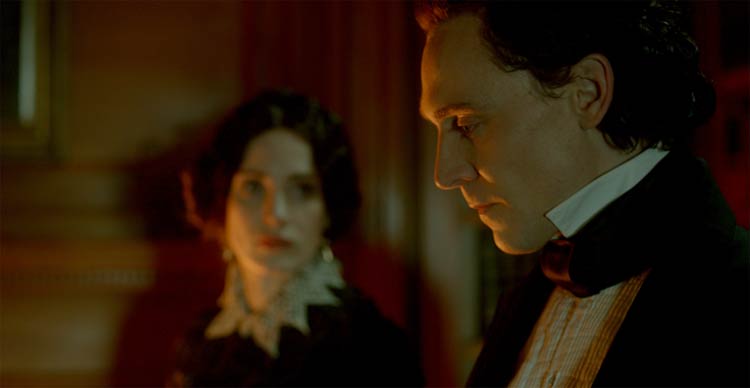
Question: How did you prepare for the role of Thomas and what did you think of the script when you first read it?
Hiddleston: The preparation in terms of syncing up with Guillermo Del Toro and his vision, his influences, was that he gave me some books to read, he directed me to Ann Radcliffe’s novel “The Mysteries of Udolpho” and “The Castle of Otranto” by Horace Walpole. They are some founding gothic romance novels and I talked to him a lot. He had such extraordinary collaborators: Kate Hawley the costume designer and Tom Sanders, and within half an hour of me having said “yes” I would like to play the part, Guillermo bundled me into his car and drove me over to the studio. Tom Sanders showed me a model of the house in miniature so I got to see a whole Crimson Peak five months before shooting back in London with the whole image in my mind. Kate Hawley had designed a wall as big as the one behind me with images that inspired her, images from the 19th century, images of gentlemen, images of perversion, images of the way people worked on the land and paintings. I remember there was a painting of Casper David Friedrich, a wanderer above a sea of fog, beautiful painting that seems to express the essence of Thomas Sharpe or at least the romanticism of the character. It was a mixture of so many things.
Question: You’re starring in this elaborate wonderful ghost story and I was wondering if there are any ghost stories that you had heard or read that stuck with you and why?
Hiddleston: I remember the ghost stories of M.R. James. I had one of those English literature teachers when I was about 10 years old who made us read things we didn’t necessarily understand but he knew that they would make an impact; he was one of the greatest teachers. If you’re lucky you’ll get one of those people along the way. On Friday afternoons knowing for a while that none of us would concentrate, he’d close the curtains and read us ghost stories from M.R. James who I think was an immaculate Gothic writer, it was fun.
Question: As an actor, how do you make your character real, considering what we know about his history? How do you go to someone like that from Hank Williams?
Hiddleston: I think to your point love is a powerful and surprising force and it’s true that I think Thomas Sharpe falling in love with Edith Cushing is real and it changes the course of his life and it changes the nature of his choices; it changes the course of the drama and that’s what I think is so beautiful. I hope people have an impression of who he is and he does fall in love with Edith and what he does is a result that affects all of them. Ultimately it is a story about love, it’s a story about the uncontrollable power of love, it’s a depiction of different kinds of love, a love that is pure, a love that is honest, that is twisted and misshapen perhaps because it’s being repressed. Ultimately the film asks the question of who gets to love in the end. It’s a battle between love and fear.
To that point of portraying Hank, I went to unknown territory. I always like exploring characters that feel different to me and in that regard Thomas Sharpe and Hank Williams are similar, they’re very different from me. Playing Hank Williams was one of the most challenging, one of the most difficult, one of the most joyful experiences of my life; it’s been so fulfilling. To understand and respect his legacy, to step into his shoes and commit to the authenticity of his songs, the way he played them, the sincerity in which he played them. I think the reason he became such a huge star was because people tell you he was the real deal. He sang about what he knew, he sang about everyday pain and everyday life, in a way that people connected to, and there was nothing phony and the job I had to do was to commit to the authenticity of that music as much as he did, and I loved it. It was hard and I learned a new kind of discipline but I’m so proud of it. I sort of created a discipline in a way, really trying to honor the material and committing myself to that.
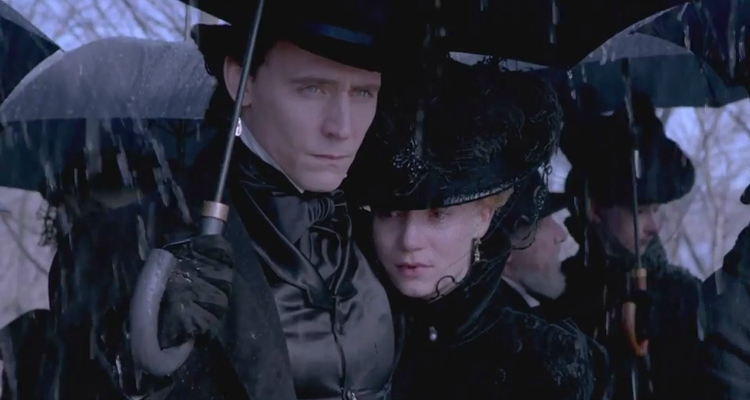
Question: Going back to romanticism you made “The Deep Blue Sea” before. I was wondering how it was for you to have a different perspective about love and romanticism, or a similar perspective, can you find what’s in common between the two movies?
Hiddleston: Terrence Davis used to say that every character in “The Deep Blue Sea” needs a specific kind of love that cannot be requited and in a way that it’s true with “Crimson Peak”. It’s about a trio of people who need a specific love and care and it’s unrequited until the very end. Things get very complicated but it’s such a different treatment of the subject matter. I feel “The Deep Blue Sea” was much more common on what it was like to live in the fifties in London, in the aftermath of the Second World War; it was a very repressed time when people tended to go along with was appropriate over with what was truthful. The character of Hester played by Rachel Weisz is about the triumph of feeling over propriety. “Crimson Peak” is something else, it’s about exploding the truth from the shadows and shining a light on the truth, actually the truth is the only way you can be free.
Question: During the waltz scene, did the candle actually stay lit?
Hiddleston: I’m here to tell you exclusively the candle never went out; we may have cheated a bit because I think it had a double wick but it was never extinguished, that’s a credit to me as a dancer.
Question: What was it like to be on smaller films like the one directed by Joanna Hogg and then moving on to movies like this and The Avengers?
Tom: It’s so interesting between different directors the scale, the palette and the taste, the way films are structured and envisioned is different but I always felt like the actor’s job is the same. I’m always asked to think about psychology and behavior, I am always asked to think about very simple thematic things in an interesting way, like a complex relationship, brother and a sister both in “Archipelago” and “Crimson Peak”. And of course Joanna Hogg handles that relationship in a different way to Guillermo Del Toro but what I’m being asked to think about is the unique intimacy bond between siblings. Also, it sometimes feels dangerous to disagree in that relationship as you rightly point out. Joanna Hogg and Guillermo Del Toro have a very different way of depicting that, how disagreement plays out in terms of speed of the action, the pace of the drama, the pitch of the emotion, the intensity of feeling, but my job is still putting myself into that head space. It’s a strange job and it often feels like the same job even if I am playing with different colors, at a different scale, it’s all acting in the end.
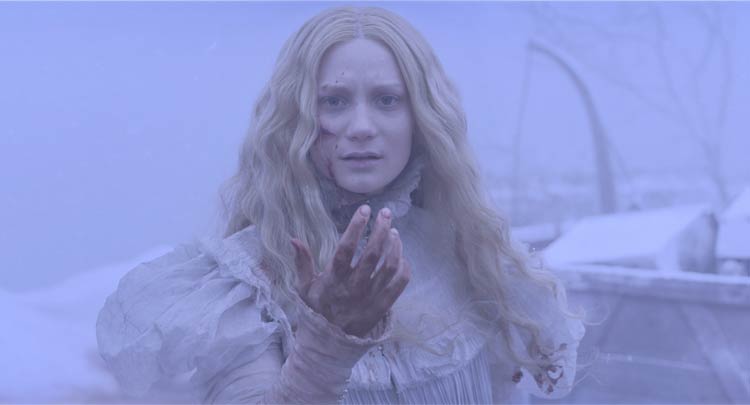
Question: How has your background in theater enhanced your experience working in film?
Hiddleston: I don’t know, they’re so different, there’s so much about them that is so different because of the process. Theater is a an art form that by repetition gets refined, as an actor you play the entire story out every night and in film as an actor you play isolated moments out, repetitively for a day and then leave it there, you never play the whole thing. They often feel like different forms. I suppose sometimes that a theater training is helpful in terms of having a discipline, where in a theater you have to imagine a fictional context wherever that might be, Shakespeare’s Venice, 19th century Russia, New York in the 50’s wherever the play happens to be, and the same is true with a green screen, you have to imagine you’re in a situation you are not actually in. I enjoy both; they still feel like different art forms to me.
Question: I saw a commonality with Loki and Thomas; they come off as monsters trying to preserve the family legacy and family inheritance. At what point you as a person and an actor think of the sins of our father or mother that inherited become our sins that we become responsible for?
Hiddleston: I suppose you become responsible when you become conscious and you do nothing about it. I think that one becomes accountable and one becomes aware of the cost of one’s actions and continues to run that course of action. Part of the experience of being alive is sifting through your inheritance and not just parental inheritance, cultural inheritance, the inheritance of your teacher and your friends. I think it’s a good thing to question what is passed on to you by other people before you take possession of it.
CRIMSON PEAK will be released in theaters on Oct. 16.
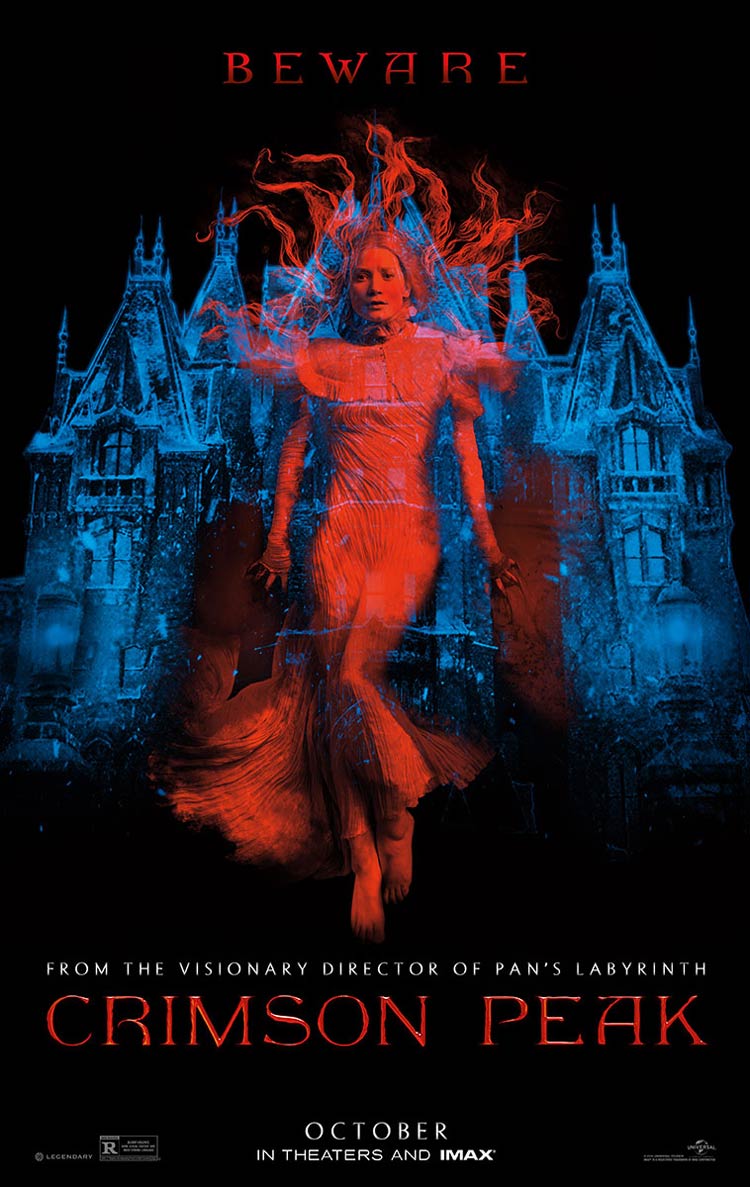
When her heart is stolen by a seductive stranger, a young woman is swept away to a house atop a mountain of blood-red clay: a place filled with secrets that will haunt her forever. Between desire and darkness, between mystery and madness, lies the truth behind Crimson Peak.




